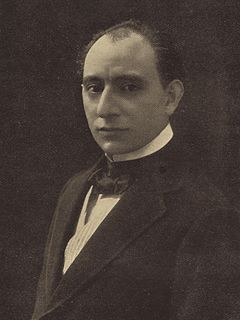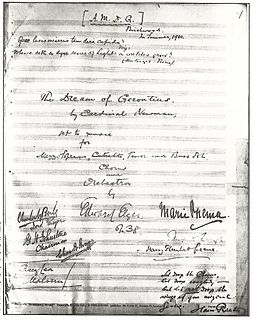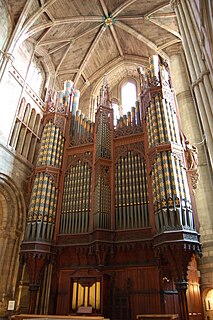Related Research Articles

Sir Edward William Elgar, 1st Baronet, was an English composer, many of whose works have entered the British and international classical concert repertoire. Among his best-known compositions are orchestral works including the Enigma Variations, the Pomp and Circumstance Marches, concertos for violin and cello, and two symphonies. He also composed choral works, including The Dream of Gerontius, chamber music and songs. He was appointed Master of the King's Musick in 1924.

Sir Landon Ronald was an English conductor, composer, pianist, teacher and administrator.

The Dream of Gerontius, Op. 38, is a work for voices and orchestra in two parts composed by Edward Elgar in 1900, to text from the poem by Saint John Henry Newman. It relates the journey of a pious man's soul from his deathbed to his judgment before God and settling into Purgatory. Elgar disapproved of the use of the term "oratorio" for the work, though his wishes are not always followed. The piece is widely regarded as Elgar's finest choral work, and some consider it his masterpiece.
In the South (Alassio), Op. 50, is a concert overture composed by Edward Elgar during a family holiday in Italy in the winter of 1903 to 1904. More than twenty minutes long, it may also be considered a "tone poem".

Falstaff – Symphonic Study in C minor, Op. 68, is an orchestral work by the English composer Edward Elgar. Though not so designated by the composer, it is a symphonic poem in the tradition of Franz Liszt and Richard Strauss. It portrays Sir John Falstaff, the "fat knight" of William Shakespeare's Henry IV Parts 1 and 2.

The Sonata in G major, Op. 28 is Edward Elgar's first sonata composed for the organ and first performed on 8 July 1895. It also exists in arrangements for full orchestra made after Elgar's death.

The Nursery Suite is one of the last compositions by Edward Elgar. Like Elgar's The Wand of Youth suites, it makes use of sketches from the composer's childhood.
Edward Elgar's Third Symphony Op. 88 (posth.) was incomplete at the time of his death in 1934. Elgar left 130 pages of sketches, which the British composer Anthony Payne worked on for many years, producing a complete symphony in 1997, officially known as "Edward Elgar: the sketches for Symphony No 3 elaborated by Anthony Payne" or in brief "Elgar/Payne Symphony No 3". The first public performance was at the Royal Festival Hall on 15 February 1998, by the BBC Symphony Orchestra conducted by Andrew Davis.
"Follow the Colours" is a marching song written by the English composer Edward Elgar in 1907, with words by Capt. William de Courcy Stretton. The song is for solo voice with an optional chorus of male voices.

The Fringes of the Fleet is a booklet written in 1915 by Rudyard Kipling (1865–1936). The booklet contains essays and poems about nautical subjects in World War I.
Polonia is a symphonic prelude by the English composer Edward Elgar written in 1915 as his Op. 76.
Carillon is a recitation with orchestral accompaniment written by the English composer Edward Elgar as his Op. 75, in 1914. The words are by the Belgian poet Émile Cammaerts.

Salut d'Amour (Liebesgruß), Op. 12, is a musical work composed by Edward Elgar in 1888, originally written for violin and piano.
Diarmuid and Grania is a play in poetic prose co-written by George Moore and W. B. Yeats in 1901, with incidental music by the English composer Edward Elgar.
Sevillana, or, as the composer titled it Sevillaña , is a short piece for orchestra by the English composer Edward Elgar written in 1884 and published as his Op. 7. It was first published by Tuckwood, with the composer's revision of 1889 published by Ascherberg in 1895. It was dedicated to W. C. Stockley, conductor of the Birmingham Festival.
Imperial March is a piece for full orchestra written by the English composer Edward Elgar to celebrate the Diamond Jubilee of Queen Victoria in 1897, as his Op. 32.
The String Quartet in E minor, Op. 83, was one of three major chamber music works composed by Sir Edward Elgar in 1918. The others were the Violin Sonata in E minor, Op. 82, and the Piano Quintet in A minor, Op. 84. Along with the Cello Concerto in E minor, Op. 85 of 1919, these were to be his last major works prior to his death in 1934.
The Severn Suite, Opus 87, is a musical work written by Sir Edward Elgar. It is a late composition, written in 1930, the result of an invitation to write a test piece for the National Brass Band Championship. It was dedicated to his friend, the author and critic George Bernard Shaw.

From the Bavarian Highlands, Op 27 is a work for choir and orchestra by Edward Elgar.
References
- Kennedy, Michael (1987). Portrait of Elgar (Third ed.). Oxford: Clarendon Press. ISBN 0-19-284017-7.
- Moore, Jerrold N. (1984). Edward Elgar: a Creative Life. Oxford: Oxford University Press. ISBN 0-19-315447-1.